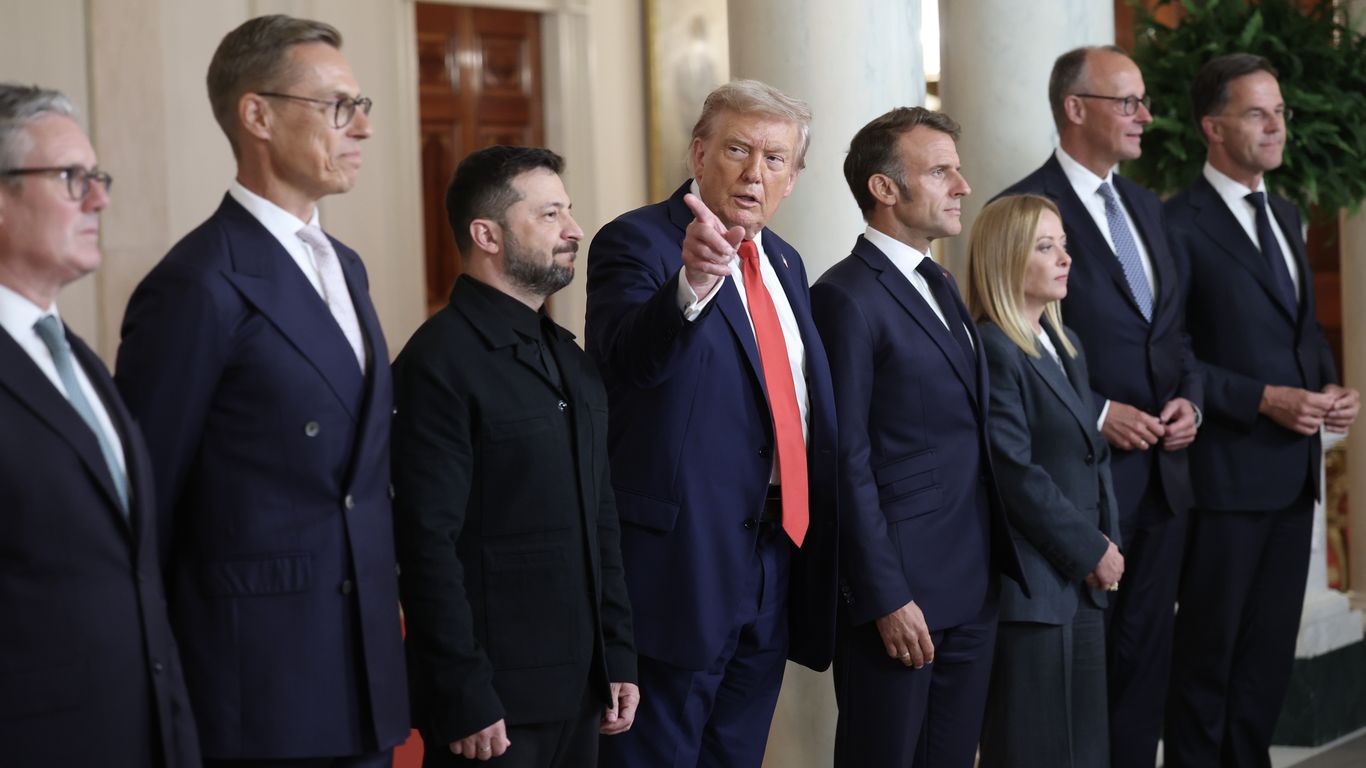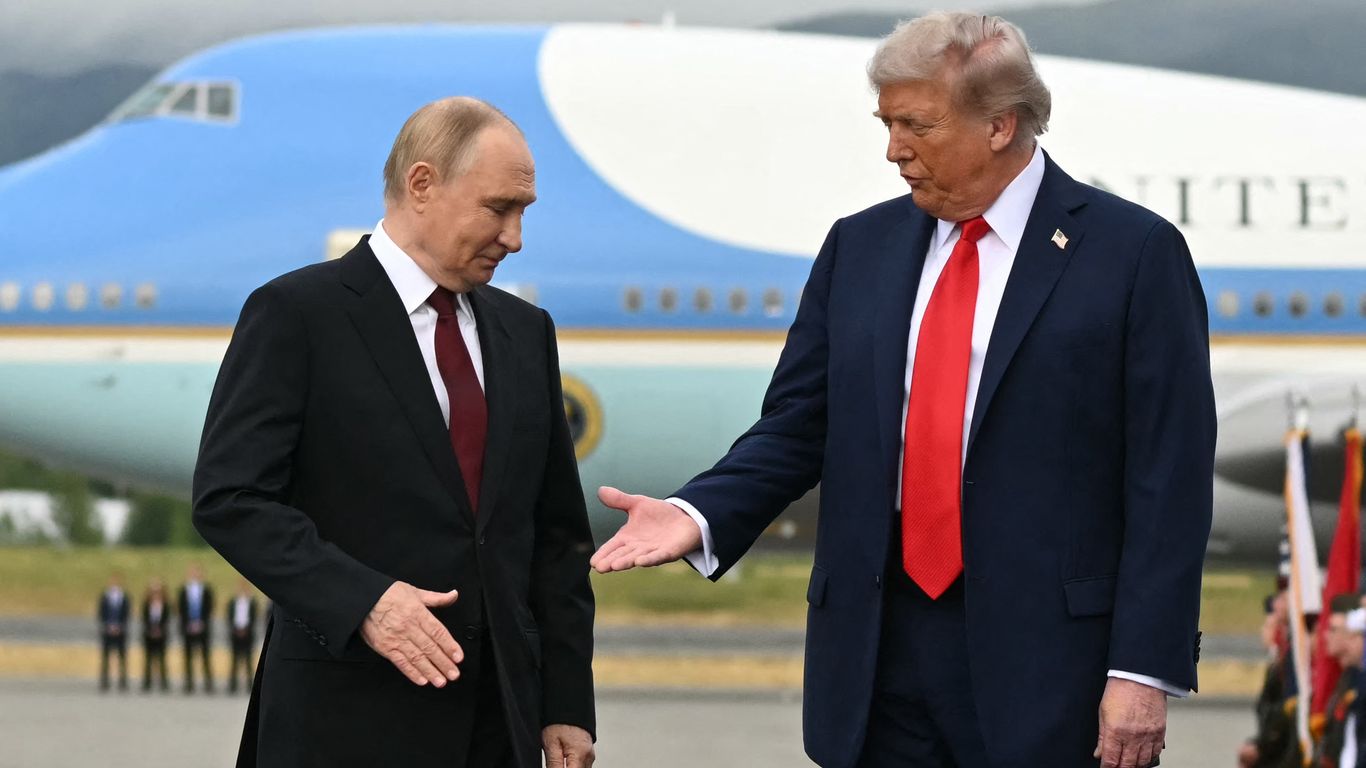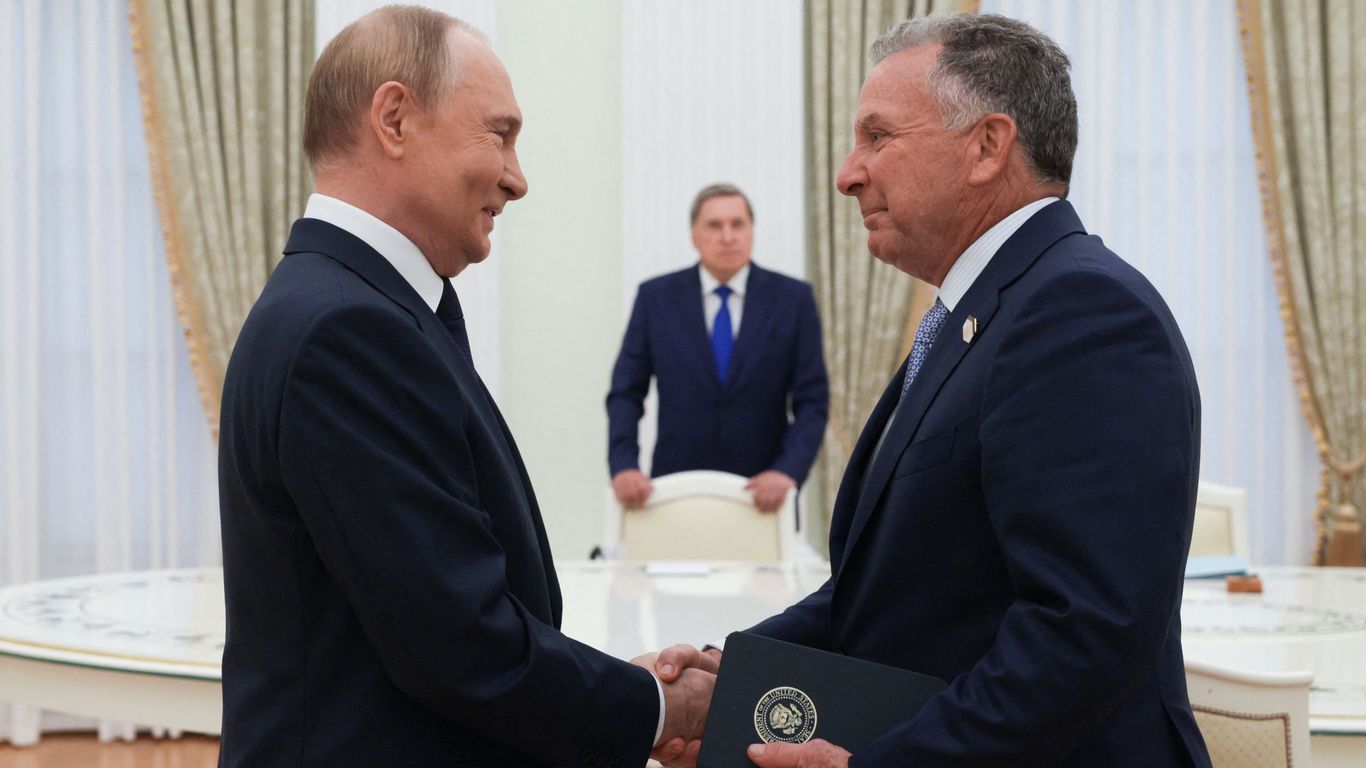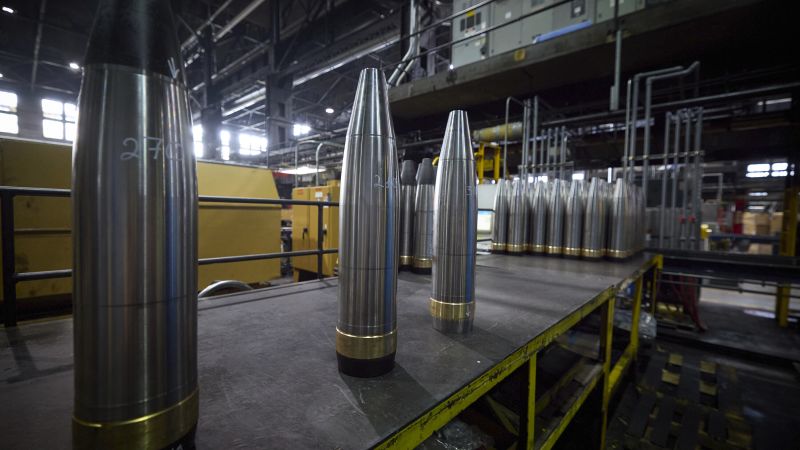Trump's Poor Negotiation Skills Highlighted by Ex-Aide

Introduction
Former national security advisor John Bolton recently sat down for an interview with The Daily Beast podcast, where he revealed some alarming insights about President Donald Trump's negotiating skills. In fact, Bolton boldly declared that Trump is the worst negotiator in the world. This shocking statement begs the question: how did Trump's lack of negotiation skills contribute to his recent summit with Russian President Vladimir Putin?
Key Details
Bolton explained that Putin had the upper hand during the summit due to his expertise in negotiation tactics. While the Russian leader came prepared with specific goals and a solid strategy, Trump was unprepared and lacked a clear agenda. This left him at a disadvantage, making it easy for Putin to manipulate the situation and come out on top. Bolton also revealed that Trump's ego and desire for praise often overshadow his ability to make sound decisions, making him an easy target for skilled negotiators like Putin.
Impact
This revelation from an ex-aide is concerning, especially in the midst of ongoing tensions between the US and Russia. Trump's poor negotiation skills could have serious consequences for international relationships and trade deals. It also sheds light on his leadership style, which has been criticized for its impulsiveness and lack of strategy. This further emphasizes the importance of having a strong, knowledgeable leader in the White House, especially in times of global uncertainty.
About the People Mentioned
John Bolton
John Bolton is an American attorney and government official known for his long career in Republican administrations and a consistently hardline approach to U.S. foreign policy. Born on November 20, 1948, in Baltimore, Maryland, he graduated summa cum laude from Yale University (B.A.) and later earned his J.D. from Yale Law School[2]. Bolton began his public service in the early 1980s under President Ronald Reagan, holding positions at the U.S. Agency for International Development and as Assistant Attorney General (1985–1989)[1]. He served as Assistant Secretary of State for International Organization Affairs under President George H.W. Bush (1989–1993)[1][2]. During the George W. Bush administration, Bolton was appointed Under Secretary of State for Arms Control and International Security (2001–2005), where he supported U.S. withdrawal from the Anti-Ballistic Missile Treaty and opposed the International Criminal Court[1]. His nomination as U.S. Ambassador to the United Nations was controversial; facing bipartisan Senate opposition, he was installed via a recess appointment in August 2005, serving until December 2006[1][3]. At the UN, Bolton was known for his blunt, confrontational style, famously remarking that the Secretariat building “has 38 stories. If it lost 10 stories today, it wouldn’t make a bit of difference”[3]. His tenure was marked by tensions with UN officials and allies, and he achieved few major diplomatic breakthroughs[3]. Bolton returned to private life as a commentator, notably for Fox News, where he advocated aggressive stances on Iran and North Korea[3]. In April 2018, President Donald Trump appointed him National Security Advisor, a role he held until September 2019[1][5]. During this period, Bolton was a vocal advocate for a tough line on Iran, Venezuela, and North Korea, but his tenure ended abruptly amid reported policy disagreements with the president[1]. Since leaving government, Bolton has remained a prominent conservative voice, authoring books and frequently commenting on foreign policy. His memoirs, including “The Room Where It Happened,” have been notable for their critical insider accounts of the Trump administration. Bolton continues to influence foreign policy debates through media appearances and writings, maintaining relevance as a staunch advocate for assertive American global leadership[6].
Donald Trump
Donald John Trump, born June 14, 1946, in Queens, New York, is an American businessman, media personality, and politician. He graduated from the University of Pennsylvania’s Wharton School in 1968 with a degree in economics. In 1971, he took over his family’s real estate business, renaming it the Trump Organization, through which he expanded into building and managing skyscrapers, hotels, casinos, and golf courses. Trump gained widespread fame as the host of the reality TV show *The Apprentice* from 2004 to 2015, which helped establish his public persona as a successful entrepreneur. Trump entered politics as a Republican and was elected the 45th president of the United States, serving from 2017 to 2021. His presidency was marked by significant policy actions including tax cuts, deregulation, the appointment of three Supreme Court justices, renegotiation of trade agreements (notably replacing NAFTA with the USMCA), and a focus on immigration control including border wall expansion. He withdrew the U.S. from international agreements such as the Paris Climate Accord and the Iran nuclear deal, and engaged in a trade war with China. His administration’s response to the COVID-19 pandemic was criticized for downplaying the virus’s severity. Trump was impeached twice by the House of Representatives—first in 2019 for abuse of power and obstruction, and again in 2021 for incitement of insurrection—but was acquitted by the Senate both times. After losing the 2020 election to Joe Biden, Trump challenged the results, culminating in the January 6, 2021, Capitol riot. He remains a central figure in American politics, having won the 2024 presidential election and returned as the 47th president in 2025, continuing to promote policies aimed at economic growth, border security, and military strength[1][2][3][4].
Vladimir Putin
Vladimir Putin is the current President of Russia, a position he has held for multiple terms since 2000, with a brief interlude as Prime Minister from 2008 to 2012[1][3]. Born in Leningrad (now Saint Petersburg) in 1952, Putin began his career in the Soviet Union’s security services, joining the KGB in 1975 and rising to the rank of Lieutenant Colonel by the time he left in 1991, following postings in East Germany and Leningrad[4]. After the Soviet Union’s collapse, he transitioned into politics, serving as an adviser to Saint Petersburg Mayor Anatoly Sobchak and later moving to Moscow, where he held various administrative roles under President Boris Yeltsin[6]. Putin was appointed Prime Minister in August 1999 and became acting President when Yeltsin unexpectedly resigned that December[3][6]. He won his first presidential election in March 2000, promising to stabilize Russia’s economy and political system after the tumultuous 1990s[3][7]. During his initial terms, he centralized power, reasserted federal control over Russia’s regions, and curtailed the influence of the country’s oligarchs through legal and economic measures[7]. Putin was re-elected in 2004 but, due to constitutional term limits, stepped aside in 2008, becoming Prime Minister under his successor Dmitry Medvedev, while retaining significant influence[3]. Constitutional amendments later extended presidential terms, and Putin returned to the presidency in 2012[1]. Putin’s time in office has been marked by assertive foreign policy, including military interventions in Syria in support of President Bashar al-Assad and the 2014 annexation of Crimea, which led to international sanctions[1]. Domestically, his tenure has seen increased state control over media, the suppression of political opposition, and constitutional changes consolidating executive authority[1]. In 2022, Russia’s full-scale invasion of Ukraine triggered a major international crisis, further isolating Russia from the West and prompting widespread condemnation[1]. As of 2025, Putin remains a dominant figure in Russian politics, having secured another term in office through constitutional changes that allow him to potentially remain president until 2036[1]. His leadership continues to shape Russia’s domestic trajectory and its role in global affairs, amid ongoing conflict in Ukraine and strained relations with NATO and Western countries[1].
About the Organizations Mentioned
The Daily Beast
The Daily Beast is an independent digital news organization known for its **award-winning original reporting, fact-informed analysis, and sharp opinion** primarily covering politics, pop culture, and power dynamics. Founded in 2008 and based in New York City, it operates with editorial independence despite being majority-owned by IAC (NASDAQ: IAC), a media and internet company. The Daily Beast’s journalism is characterized by a **non-partisan but not neutral stance, being skeptical yet never cynical**, which allows it to deliver incisive and impactful stories[1][2]. Throughout its history, The Daily Beast has built a reputation for breaking significant news stories and frequently scooping larger outlets, reaching over **1 million readers daily**. Its multi-platform presence includes not only its website but also **podcasts, newsletters, a dedicated app, and an extensive membership program**, enabling broad engagement across audiences. The organization’s readership is diverse, with a strong demographic of adults aged 25-54 and a significant portion having household incomes above $100,000, reflecting a relatively affluent and engaged audience[1][4]. The Daily Beast has earned numerous journalism awards, highlighting its credibility and influence in media. Despite its strengths, it is rated by Ad Fontes Media as having a **left-leaning bias** with mixed reliability scores, reflecting the blend of news and opinion content it produces[3]. Leadership includes CEO and Publisher Ben Sherwood, Executive Editor Hugh Dougherty, and Chief Creative and Content Officer Joanna Coles, who steer the editorial and business strategy[2]. Today, The Daily Beast remains a vital source for fast, intelligent coverage on current affairs, blending investigative journalism with sharp cultural commentary. It continues to innovate in digital media, maintaining relevance in the competitive landscape of political and entertainment news[1][5].
White House
The **White House Office** is a central organizational component within the Executive Office of the President of the United States (EOP), tasked with supporting the President in managing day-to-day operations, policy formulation, and political affairs. It is headed by the White House Chief of Staff and staffed by senior aides who report directly to the President, including those with titles such as Assistant to the President and Deputy Assistant to the President. These staff members are mostly political appointees without the need for Senate confirmation, allowing the President considerable discretion in shaping the office to suit each administration's priorities[1]. Historically, the White House Office was established in 1939 through Reorganization Plan 1 and Executive Order 8248 to provide immediate assistance to the President. It functions as the nerve center for presidential staff, physically located primarily in the West Wing, and plays a pivotal role in managing the President’s policy agenda, communications, and political strategy. Its flexible organization allows each President to tailor the staff composition and roles according to their governance style and objectives[1]. In the current context of 2025, the White House Office operates under the administration of President Donald J. Trump, who returned to office after the 2024 election. His administration emphasizes rejecting prior policies deemed extremist and focuses on enhancing quality of life, economic growth, and American energy dominance. The administration includes Vice President JD Vance and First Lady Melania Trump, among others, with a Cabinet advising on various governmental functions[4][6]. Recent initiatives linked to the White House’s operational sphere include the establishment of a new **Department of Government Efficiency (DOGE)** aimed at modernizing federal technology and software to boost government productivity. The DOGE agenda is implemented through the renamed United States DOGE Service within the Executive Office, reflecting a concerted push to leverage technology for administrative modernization[5]. Notably, the White House Office also coordinates national security and homeland security functions through the National Security Council staff, underscoring its central role



















